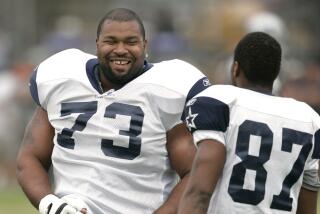Pokey’s Approach : Boise’s Allen Duels Cancer With Determination, Unique Perspective
- Share via
BOISE, Ida. — He can handle the cancer and the chemotherapy and the radiation and the baldness and the gaunt look and the constant exhaustion and the realization that it was fourth-and-long for a while.
He didn’t even mind when strangers came to the office, asked for a moment with him, then began to pray for him out loud, one of the guys touching the infested spot high on the coach’s right arm as he spoke.
But Pokey Allen has reached his limit. The Boise State football team’s new season is barely 26 hours old, just the second morning of two-a-days, and already practice has become sloppy, unenthusiastic.
“We were lousy,” he says, actually choosing a far more colorful adjective.
As if Allen would trade the moment. Eight months after a grapefruit-sized growth was found in his right triceps, about five months after surgery removed the tumor and part of the muscle, seven weeks after he almost died in a Seattle hospital from the side effects of chemotherapy and a cell transplant and three weeks after admitting to himself he couldn’t make the start of practice, he has done just that.
No doctor could offer a better treatment, so his disgust, while not welcomed by the players, is wonderful. His wearing down by lunchtime, when he will crash on the office couch as the assistants go over film from the first practice, can’t begin to compare with the sight of him walking back out to the field for the 7 p.m. session.
“I don’t think he wants it to motivate us,” quarterback Tony Hilde said, “but I think that is what’s going to happen.”
In turn, the Broncos, a favorite for the Division I-AA title, may reward Allen with his first national championship after a couple of second-place finishes at Portland State and another at Boise State in 1994. Eighteen starters are back from that 13-2 team.
And so is the coach.
*
The bad health was discovered in the name of good health. Allen had undertaken a personal training regimen last season and by November was up to two sets of 100 sit-ups and 50 pushups. One day he awoke with what seemed like a pulled muscle above the elbow on the back of his right arm.
The sensation stayed with him as the Broncos, picked by most to finish somewhere in the middle of the Big Sky Conference, gained momentum in an unlikely run through the playoffs. He was in real pain by the time they scored two touchdowns in the fourth quarter and beat Marshall in the semifinals, 28-24. That was Dec. 10.
Allen saw the team doctor, who was concerned enough to immediately order an MRI for Monday of the championship-game week. Then, on Wednesday, a biopsy was done. Suddenly, Allen was constantly tired, strange for him. He even went to bed at 9 p.m. at the hotel in West Virginia as Boise State readied to play Youngstown State of Ohio. On Sunday, the Broncos lost, 28-14.
The next day, back in Boise, he talked to the doctor on the phone and got the bad news in the form of directions: Go to Saint Alphonsus Cancer Treatment Center. Once there, the 51-year-old coach who had enjoyed perfect health was told he had a rare children’s disease--rhabdomyosarcoma.
Cancer.
“The one thing to my credit, the only thing, [is] I didn’t ever say, ‘Why me?’ ” Allen said. “I had been healthy, never been to the hospital for 51 years. You think, ‘Why not me? Everybody gets cancer. Now let’s deal with it.’ ”
Two days later, the afternoon after he had been named Big Sky coach of the year, his condition was disclosed at a news conference. His doctor, Carolyn Collins, put Allen’s chances of reaching age 75 at 50-60%. Chemotherapy began immediately.
Allen never believed such numbers, wondering how accurate they could be, considering that fewer than 100 people older than 50 get the aggressive tissue cancer every year in the United States and that only 1,000 people get it at all. In his thinking, he was part of a group that really didn’t even exist.
Not that it made a difference in the bottom line.
It had become apparent by late March, a week after the tumor had been surgically removed, that the original treatment was not working. Collins altered Allen’s prognosis to say he had only a 10-15% chance to live another five years without a new course. Had it been football season, the coach insisted, he would have taken his chances, rather than miss games merely to increase his chances to 30-35%.
“I wasn’t going to miss football for a 15% increase,” he says now.
Good thing, then, that it was the off-season. Allen went to a hospital in Seattle, had the cell transplant to reverse the damage caused by the high doses of chemotherapy, then almost died around the Fourth of July. He was back in Boise within a few weeks, though, and back in the office July 31. He hasn’t missed a day yet, abbreviated as his working days may be.
“I’ll be there for this year,” he said. “Hell, I think I’m indestructible. I really do--35%, what does that mean? I think I’ll beat it. I think I’ll live to be 80.”
The radiation and the chemotherapy have given way to conventional medication and regular checkups--as long as the cancer does not reappear. So far so good. Allen still can stomach only bland food--plain hamburgers, milkshakes, peanut butter and jelly toast. He is 37 pounds lighter than a year ago and gets worn down faster than an out-of-shape offensive lineman running 40s, but the lab results are encouraging.
So is the word from the field. The assistant coaches and Athletic Director Gene Bleymaier, a former UCLA tight end, talk of Allen’s increasing stamina and improved appearance. He has even preferred to stand watch over a light scrimmage or walk from station to station, rather than use a golf cart.
That’s not as surprising as it might be. Allen’s reputation has been built on winning (80-36-2 in nine seasons), having well-conditioned clubs (five of the 13 victories last season resulted from fourth-quarter scoring) and ruling with such an easygoing style that children run onto the field as the players stretch and don’t get shooed off for five minutes.
Allen is the same guy, after all, who gained notoriety in Portland for agreeing to a promotional campaign that allowed fans to call one play every home game.
Pokey Allen lives on food, sleep, football and humor, and a little thing like rhabdomyosarcoma won’t change that.
Another good sign is that the assistants are teasing now.
Surprised you made it back, assistant head coach Tom Mason tells him. We thought you were going to die. And, by the way, you look like Uncle Fester.
On one recent day, Allen walked into the office of defensive line coach Barry Sacks and started ranting.
“Look at me,” he said. “I’m wrinkled. I’m skinny. I’m ugly.”
“Yeah, you’re right,” Sacks replied. “But you were ugly before.”
This affection has carried over to the fans, among whom Allen is so popular that people have taken to sending motivational and self-help books and tapes. The mailings are all over his office, along with the, uh, nutritional supplements that have arrived. Carrot juice crystals, anyone? Barleygreen, with brown rice and kelp? Shark cartilage, in pill form?
Pokey, being Pokey, has sampled most of them.
“What the hell,” he said. “Medical science is not the answer to everything.”
Allen will also tell you that he is not worried about a return of the cancer, that he is not looking over his shoulder and sweating the disease described in one medical encyclopedia as so aggressive that “removal is rarely possible, because the tumor has nothing to stop it and tends to spread. Removing an affected leg or arm may help.”
Hey, Utah State is coming up in a couple of weeks, and Boise State is the preseason No. 1 in at least three national publications.
After all, this is the guy who found out he had a disease that kills, went to a news conference to bare his medical chart to the world and said of the impending chemotherapy, “You can drink beer with it. I mean, how bad can it be?”
But then the beer started to taste bad, and so did most things with any real flavor. So Pokey looks forward to the next cold one, the chance to play golf next spring, a normal summer at his cabin on the lake in Montana, where the biggest decisions are supposed to be what to grill for dinner and whether to water ski now or later.
All those things used to happen without a second thought.
“I don’t know. I guess I’m a better person, probably,” Allen said grudgingly.
“Yeah, I’m a better person. I feel a little different toward people, a little more sympathetic, maybe, to their frailties. Not our football team, though. Those lazy suckers. Boy, did they have a bad practice!”
More to Read
Go beyond the scoreboard
Get the latest on L.A.'s teams in the daily Sports Report newsletter.
You may occasionally receive promotional content from the Los Angeles Times.










